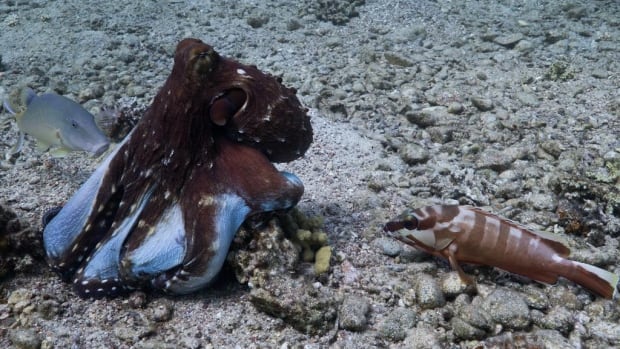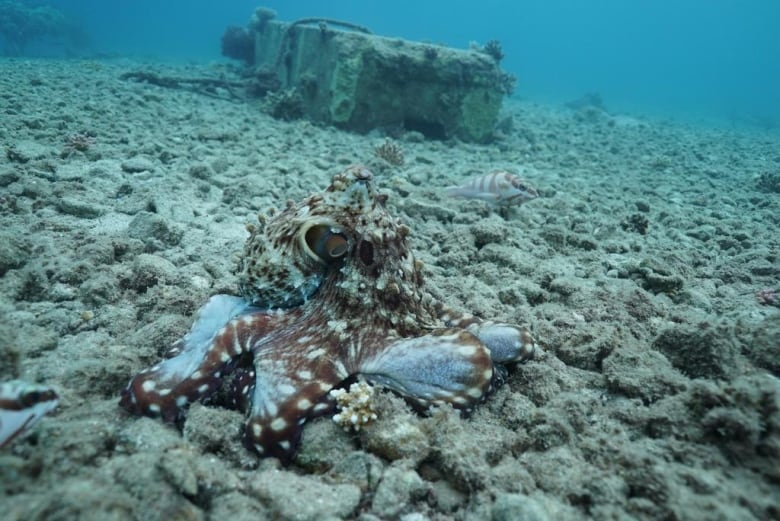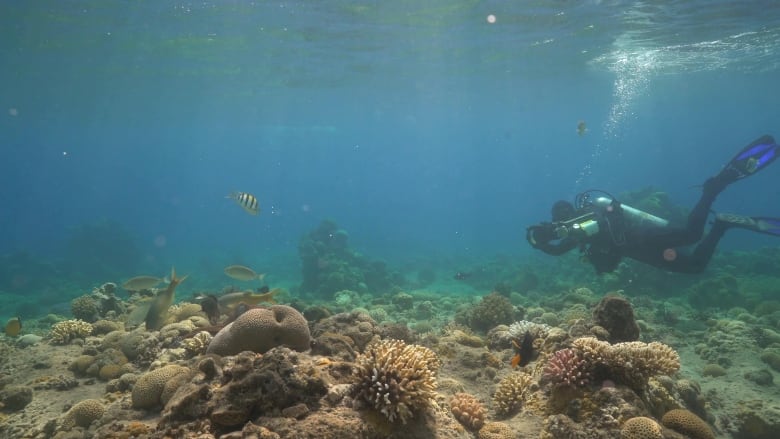
As It Happens6:26Picture of 4,000 dead birds in Toronto wins international photography award
Despite their reputation as loners, it turns out octopuses will happily hunt in groups with other species — as long as everyone knows who’s boss.
Scientists in Germany have captured hours of footage of octopuses working in tandem with different species of reef fish to track down prey like smaller crustaceans, fish and molluscs and flush them out of their hidey-holes.
These hunting groups follow “a very complex leadership dynamic” that’s not so different from your average human workplace, says biologist Eduardo Sampaio.
“Say there are three or four that are pitching ideas or providing options. So these are the fish,” Sampaio told As It Happens host Nil Köksal.
“One person, for example, in a company would be the CEO or the chairman that decides, ‘OK, I like this idea. We ‘ll go in this direction.’ So the octopus plays this role.”
Sampaio, of the Max Planck Institute of Animal Behaviour, is the lead author of a study examining the social dynamics of these octopus-fish collaborations, published this week in the journal Nature, Ecology & Evolution.
Their findings are based on more than 100 hours of footage of O. cyanea, better known as big blue octopuses or day octopuses, hunting along the the shallow reefs of Israel, Egypt, and Australia.
A win-win situation
Octopuses are known as solitary creatures, says Sampaio. And when they’re dining solo, they use a tactic called “speculative hunting.”
That means they move along the coral, shells and rocks, going from crevice to crevice, and doing what’s known as a “web over,” wrapping their tentacles and the webbing that connects them around the hideout to root out and trap any prey lurking within.
But when they work alongside reef fish, like goatfish and groupers, they take a different approach.
“They stay in the same location, and then the fish themselves go look for prey. And once [the fish] corner the prey, the octopus moves directly there and, with one movement, does the web over,” Sampaio said.
“It creates a very difficult situation for the prey, right? Because either the prey stays inside of the crevice and the octopus eventually will get it with its arms, or it tries to flee and then has the fish outside waiting for it.”
This, he says, is a win-win for the octopus and its fishy friends.
“If the fish were hunting alone, the prey can go to crevices and they can’t get it,” he said. “If the octopus was hunting alone, it couldn’t find the prey as quickly. And when it finds it, there’s always the danger that the prey flees.”

Zoologist Michael Vecchione, who wasn’t involved in the research, says he’s heard of this phenomenon before, but this is the first study he’s seen that tries to analyze and identify the social dynamics at play.
“They did a nice job of trying to get a quantitative handle on what’s going on,” said Vecchione, the curator of cephalopods at the National Museum of Natural History in Washington, D.C.
Still, Vecchione says a lot of questions remain unanswered. For example, is this a co-ordinated hunting strategy? Or are the sea creatures simply hunting the same reefs at the same time, and taking advantage of each other’s presence?
“I wonder if there’s an element of, basically, chaos to their interactions,” he said. “As opposed to the octopus and the goatfish every morning look for the others to go out and work together.”
Collaboration not without conflict
Just because hunting together is mutually beneficial for everyone involved, doesn’t mean it’s always amicable, according to Sampaio.
First of all, there’s no sharing the spoils. Whoever nabs the prey gets to gobble it up, he says, and there’s no guarantee everyone will get a piece.
And if a fish falls out of line, the octopus will punch it into submission — a phenomenon Sampao first observed in 2020.

There are several scenarios that might provoke an octopus to fisticuffs, he said, including a lack of balance within the group’s composition.
The goatfish play a key role in the hunt, going ahead of the pack to scout out prey, and signalling their discoveries to the octopus, who ultimately decides whether the group should follow. The groupers, meanwhile, mostly just reap the benefit of everyone else’s hard work.
So if a hunting party has too many slackers and not enough scouts, “then the octopus has to do everything.”
“It doesn’t like to have to do everything, so it starts punching,” Sampaio said.
Fish-on-fish violence is also a factor, he said. When everyone’s swarming for the same tasty morsel, it can become free for all, with some fish pushing others of the way.
“But you will never see a fish displace or do anything to the octopus,” Sampaio said.
“It’s quite interesting because it shows that it’s a bit of an understanding of, like, we can’t do anything to the octopus because if it leaves, then none of us are getting anything — which I think is quite cool.”